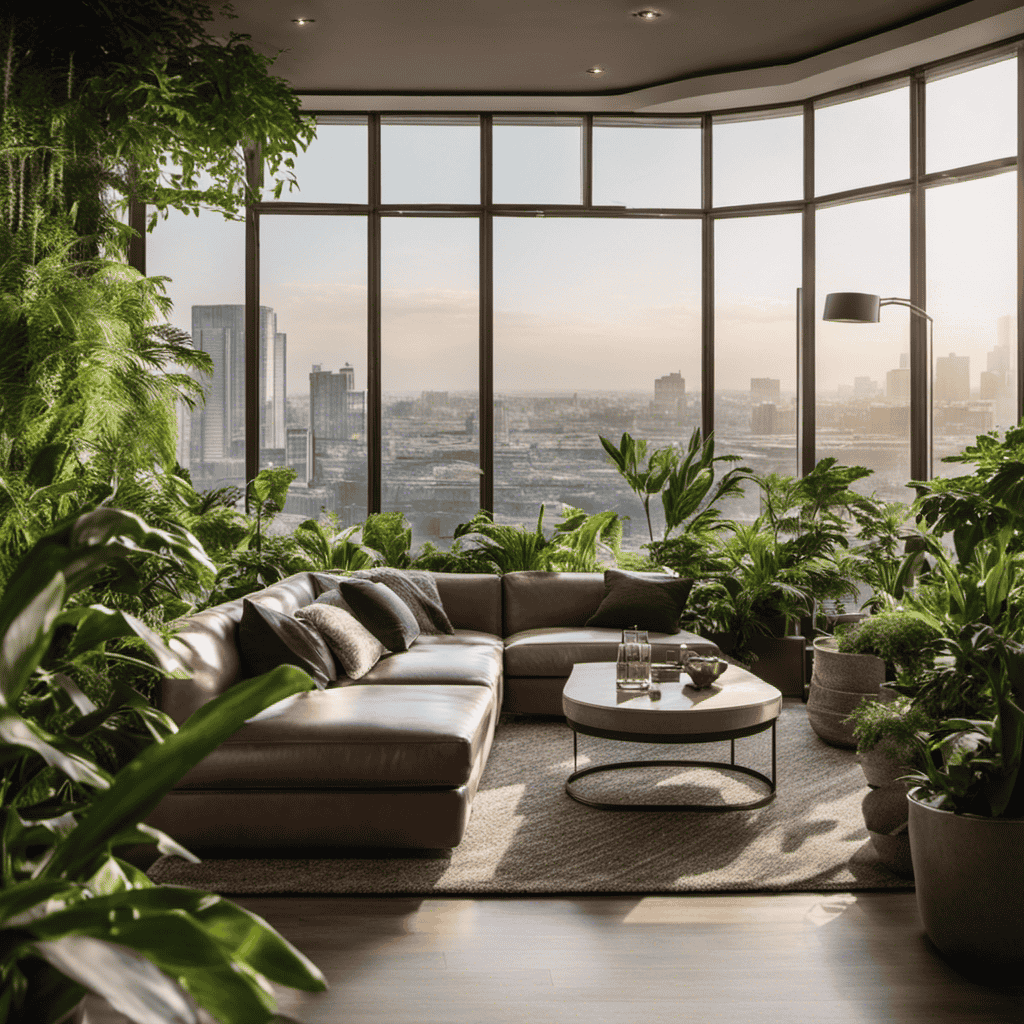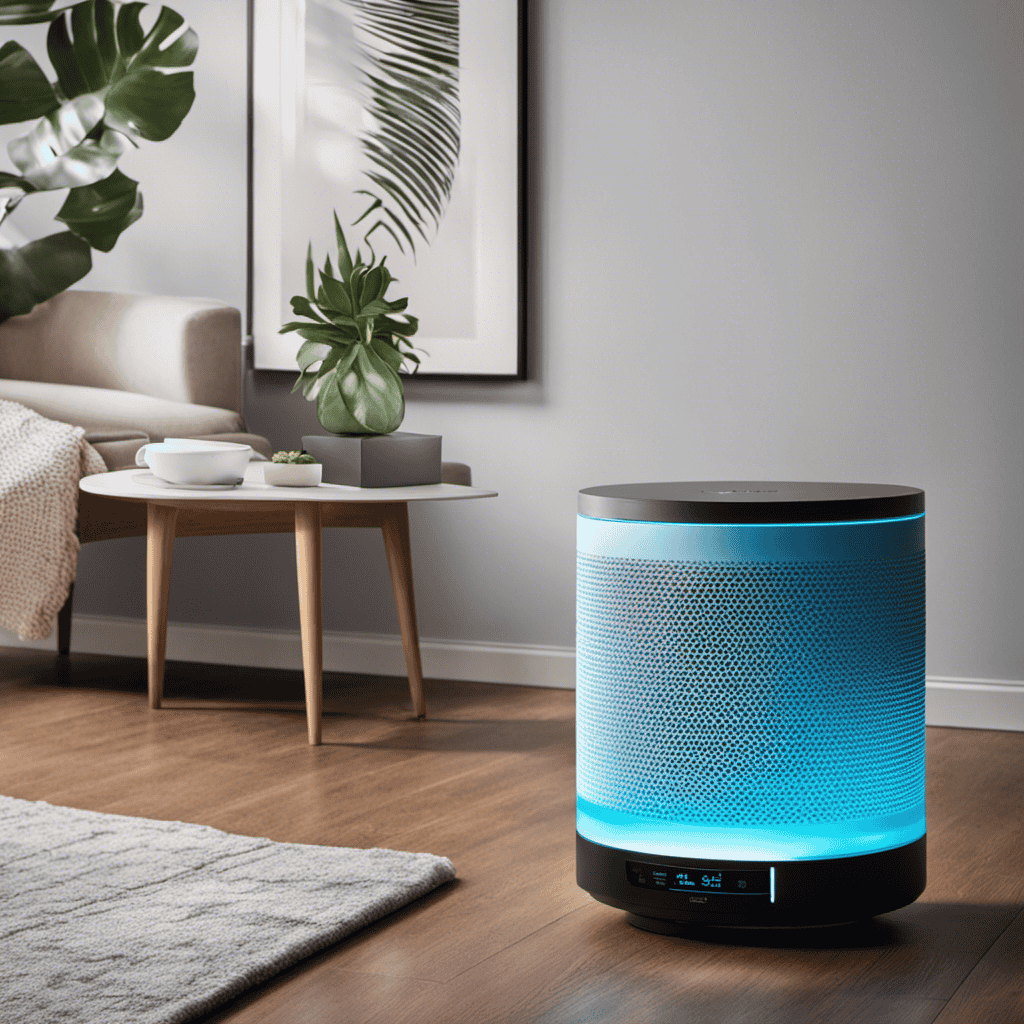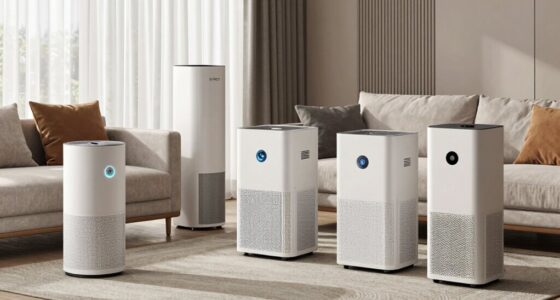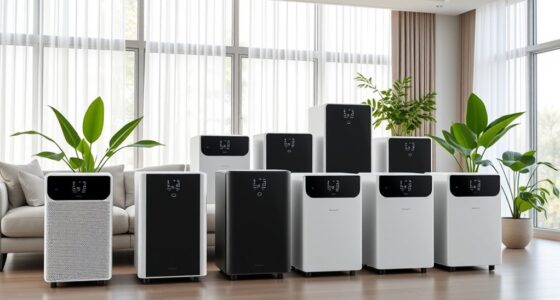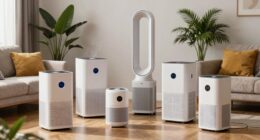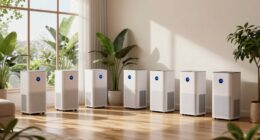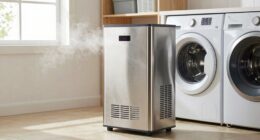Residing alongside a highway may seem as though you’re ensnared in a storm of pollution, with hazardous particles perpetually circulating. However, there’s no need to worry, as I’ve discovered the perfect solution!
In this article, I’ll guide you through the world of air purifiers and help you find the best one to combat highway pollution. We’ll explore different types of purifiers, factors to consider, and top features to look for.
So, let’s clear the air and breathe easier together!
Key Takeaways
- Air purifiers with low decibel ratings are recommended for noise-sensitive areas, such as living next to a highway.
- Prolonged exposure to noise pollution from highways can lead to increased stress levels and sleep disturbances, as well as an increased risk of cardiovascular problems.
- High-efficiency particulate air (HEPA) filters are effective in trapping particles as small as 0.3 microns, including dust, pollen, and some gases, which can be found near highways.
- Activated carbon filters are useful in removing odors, gases, and chemicals from the air, which can be present near highways.
Types of Air Purifiers
There’s a few different types of air purifiers you can consider for living next to a highway.
One option is a high-efficiency particulate air (HEPA) filter. These filters are designed to trap particles as small as 0.3 microns, including dust, pollen, and some gases. HEPA filters are highly effective in removing airborne pollutants, which can be particularly beneficial when living near a highway where there may be higher levels of pollutants.
Another type of air purifier is an activated carbon filter. These filters are effective in removing odors, gases, and chemicals from the air. They work by adsorbing the pollutants onto the carbon surface.
Additionally, some air purifiers utilize both HEPA and activated carbon filters to provide comprehensive air cleaning.
Using an air purifier can help improve the air quality in your home and reduce the potential health risks associated with living near a highway.
Factors to Consider When Choosing an Air Purifier
When selecting an air purifier, it’s important to consider the noise level impact it may have. High noise levels can be disruptive and affect the comfort and productivity of individuals in the vicinity.
Additionally, it’s crucial to assess the filter replacement frequency of the air purifier as this directly impacts its efficiency in removing pollutants from the air. Regular filter replacements ensure optimal performance and maintain a clean and healthy environment.
Noise Level Impact
If you live next to a highway and are concerned about noise levels, you should consider purchasing an air purifier with a low decibel rating.
Noise pollution from highways can have detrimental effects on our health. Studies have shown that exposure to high levels of noise can lead to increased stress levels, sleep disturbances, and even cardiovascular problems.
The constant sound of traffic can disrupt our sleep patterns, causing fatigue and decreased cognitive function. Additionally, prolonged exposure to noise pollution can lead to elevated blood pressure and an increased risk of heart disease.
To mitigate these health effects, it is important to choose an air purifier with a low noise level, typically measured in decibels. Look for air purifiers specifically designed for quiet operation, ensuring a peaceful and healthy living environment.
Filter Replacement Frequency
To maintain optimal performance, it’s important to regularly replace the filters in your chosen quiet-operating purifier. Here are some key points to consider when it comes to filter replacement frequency:
- Filters play a crucial role in capturing airborne particles and maintaining clean indoor air.
- Regular filter replacements ensure that your purifier continues to efficiently remove pollutants.
- Neglecting filter replacement can lead to decreased air purifier performance.
- Filter replacement cost varies depending on the model and type of filters used.
- Some air purifiers have indicator lights that notify you when it’s time to replace the filters.
Understanding the importance of timely filter replacements can help you maintain the effectiveness of your air purifier and improve indoor air quality. Now, let’s delve into understanding air quality levels.
Understanding Air Quality Levels
You can easily determine the air quality levels in your area by checking the Air Quality Index (AQI) on a reliable website. The AQI measures the concentration of common air pollutants and provides a numerical value that corresponds to the level of air pollution.
Poor air quality can have serious health effects, including respiratory issues, cardiovascular problems, and even increased risk of cancer. Common air pollutants include particulate matter, ozone, nitrogen dioxide, and sulfur dioxide. These pollutants can come from various sources such as vehicle emissions, industrial activities, and natural processes.
It is important to be aware of the air quality in your area to protect your health and well-being. With this understanding, let’s now explore the top features to look for in an air purifier.
Top Features to Look for in an Air Purifier
When considering the features of an air purifier, it is important to take into account the noise level impact, filter replacement frequency, and coverage area size.
The noise level impact refers to the amount of noise that the air purifier generates while in operation, which can be an important consideration for those who are sensitive to noise or need a quiet environment.
The filter replacement frequency refers to how often the filters in the air purifier need to be replaced, which can have an impact on the maintenance and cost of the device.
Lastly, the coverage area size refers to the maximum area that the air purifier can effectively clean, ensuring that it is suitable for the specific space in which it will be used.
Noise Level Impact
The noise level of an air purifier can be a significant factor to consider when living next to a highway. High levels of noise can have a detrimental impact on sleep, causing disruptions and leading to sleep deprivation. Lack of quality sleep can have various health effects, including increased stress levels, reduced cognitive function, and compromised immune system.
To evoke an emotional response in the audience, here are five key points to consider:
- Constant noise from the air purifier can make it difficult to fall asleep and stay asleep.
- Sleep disturbances can lead to daytime fatigue and decreased productivity.
- Prolonged exposure to excessive noise can contribute to elevated blood pressure and cardiovascular issues.
- Persistent noise can cause annoyance, irritability, and negatively affect overall well-being.
- Choosing a quiet air purifier can help create a peaceful and restful environment for better sleep and improved health.
Filter Replacement Frequency
One factor to consider when choosing an air purifier is how often the filters need to be replaced. The frequency of filter replacement is important because it can affect the overall cost of owning and maintaining the purifier. Different air purifiers have different filter replacement schedules, so it is crucial to choose one that aligns with your needs and budget.
Common pollutants such as dust, pollen, pet dander, and smoke can clog the filters quickly, requiring more frequent replacements. It is also important to consider the filter replacement cost, as some filters can be expensive to replace. By understanding the filter replacement frequency and cost, you can make an informed decision about which air purifier is best suited for your needs.
Now, let’s explore another important factor in choosing an air purifier: the coverage area size.
Coverage Area Size
Understanding the coverage area size of an air purifier is essential in determining its effectiveness in filtering pollutants in a given space. The coverage area size refers to the maximum area in square feet that an air purifier can effectively clean.
When considering the effectiveness of an air purifier, it is important to consider the following factors:
-
Room size: The size of the room where the air purifier will be used is crucial in determining the appropriate coverage area size.
-
Pollutant concentration: The level of pollutants in the air will impact the effectiveness of the air purifier. Higher pollutant concentrations may require a larger coverage area.
-
Air changes per hour: The number of times an air purifier can filter the entire volume of air in a room in an hour is an important factor in determining its effectiveness.
-
Filter efficiency: The efficiency of the air purifier’s filters in capturing pollutants will affect its overall effectiveness.
-
Cost comparison: While larger coverage area sizes may provide more effective filtration, they also tend to be more expensive. It is important to consider the cost-effectiveness of the air purifier based on the coverage area size needed.
Understanding these factors will help in making an informed decision when choosing an air purifier that is best suited for filtering pollutants in a given space.
In the subsequent section, we will explore the best air purifiers specifically designed to tackle highway pollution.
The Best Air Purifiers for Highway Pollution
If you live next to a highway, you should consider getting an air purifier that is specifically designed to tackle highway pollution. These air purifiers are equipped with advanced filters that can effectively capture and eliminate pollutants commonly found near highways, such as vehicle exhaust fumes and fine particulate matter.
Not only do they remove harmful substances from the air, but they also help alleviate allergies and provide cleaner air for pets. Look for air purifiers that have a high CADR (Clean Air Delivery Rate) and a HEPA (High-Efficiency Particulate Air) filter, as these are the most effective in removing pollutants from the air.
Additionally, consider purchasing an air purifier with a larger coverage area to ensure that it can effectively clean the air in your living space. To maintain and clean your air purifier, regular filter replacements and routine cleaning of the unit are essential to ensure its optimal performance and longevity.
How to Maintain and Clean Your Air Purifier
To keep your air purifier running efficiently, make sure you regularly replace the filters and clean the unit. Proper air purifier maintenance is essential for optimal performance and to ensure that the air in your home remains clean and healthy. Here are some air purifier cleaning techniques to help you maintain your unit effectively:
- Vacuum the exterior of the air purifier to remove dust and debris.
- Clean the pre-filter regularly by rinsing it with water and allowing it to dry thoroughly.
- Replace the filters as recommended by the manufacturer to maintain their effectiveness.
- Wipe down the control panel and buttons with a damp cloth to remove any dirt or grime.
- Keep the surrounding area clean and dust-free to prevent the accumulation of particles on the air purifier.
By following these air purifier maintenance and cleaning techniques, you can ensure that your unit is functioning optimally and providing you with clean and fresh air.
Now, let’s move on to some tips for improving indoor air quality.
Tips for Improving Indoor Air Quality
Here are some simple techniques you can use to improve the quality of the air in your home. One of the most effective ways to achieve this is by using an air purifier. Not only does it filter out pollutants, but it can also help improve sleep quality and reduce allergies. When choosing an air purifier, consider factors such as the size of your room, the type of filter it uses, and its noise level. Here is a table comparing different types of air purifiers:
| Type of Air Purifier | Features | Pros |
|---|---|---|
| HEPA Filter | Removes particles as small as 0.3 microns | Highly effective at reducing airborne allergens |
| Activated Carbon Filter | Absorbs odors and chemicals | Great for eliminating unpleasant smells |
| UV-C Light Purifier | Destroys bacteria and viruses | Helps reduce the spread of illnesses |
Is an Air Purifier Effective for Reducing Highway Pollution in a Residential Area?
Living near a highway can expose you to higher levels of pollution. A good air purifier under £200 can help reduce the impact of highway pollution in a residential area. Look for a HEPA filter and activated carbon to effectively remove airborne pollutants, providing cleaner air for you and your family.
Frequently Asked Questions
How Far Should I Place My Air Purifier From the Highway to Effectively Reduce Pollution?
Placing an air purifier closer to the highway can effectively reduce pollution, but it’s important to create a barrier between your home and the highway. Living near a highway can have long-term health effects.
Can an Air Purifier Completely Eliminate All Highway Pollutants From My Indoor Air?
Air purifiers can help reduce highway pollutants indoors, but they may not completely eliminate them. There are limitations to their effectiveness, and they may not fully mitigate the health risks associated with living near a highway.
Are There Any Specific Air Purifier Models That Are Known to Be More Effective in Reducing Highway Pollution?
Some air purifier models are more effective in reducing highway pollution. However, alternative methods like planting trees or using sound barriers can also help reduce pollution near highways.
Can an Air Purifier Remove the Smell of Exhaust Fumes From the Air?
An air purifier can effectively remove the smell of exhaust fumes from the air. This is beneficial for both indoor air quality and our health, as exposure to exhaust fumes can have harmful effects.
Do Air Purifiers Require Regular Filter Replacement, and if So, How Often Should It Be Done?
Do air purifiers require regular filter replacement, and if so, how often should it be done? Consider the effectiveness of air purifiers in reducing highway pollution and the factors to consider when choosing one for homes near highways.
Conclusion
In conclusion, living next to a highway can greatly impact the air quality in your home. To combat the pollution, it’s crucial to invest in a reliable air purifier.
By considering factors such as the type of air purifier, air quality levels, and top features, you can find the best option to meet your needs.
Regular maintenance and cleaning of the air purifier are essential to ensure its effectiveness.
Following these steps will help improve the indoor air quality and create a healthier living environment.
